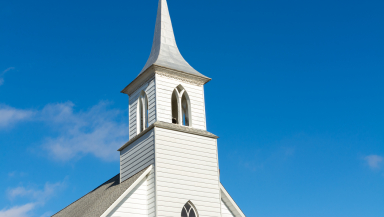
More than 400 acts of hostility were recorded against churches in the United States in 2024, with a sharp rise in gun-related incidents, according to a new report released by the Family Research Council.
The incidents highlighted in the group's "Hostility against Churches in the United States" report released Monday morning ranged from vandalism and arson to gun-related threats, bomb hoaxes and physical assaults.
The Washington-based conservative Christian advocacy organization documented 415 hostile acts across 43 states, affecting 383 churches, based on open-source documents, media reports and official records.
The total was slightly lower than the 485 incidents identified in 2023 but remained well above the yearly totals from 2018 through 2022. Since January 2018, the organization has tracked 1,384 incidents.
"Although the motivations for many of these incidents remain unknown, the rise in crimes against churches is taking place in a context in which fewer Americans are attending religious services or identifying with a specific faith," the report notes.
According to Gallup data, less than a third of the U.S. population regularly attends church services, and researchers say "fewer Americans share a common understanding of what church buildings represent."
"It is important to note that not all crimes against churches are motivated by hatred for Christianity. Some vandals appear to be motivated by financial gain through theft, while other culprits are teenagers engaging in a destructive pastime," the report states.
"However, there are still incidents that seem to be targeting church intentionally and with malicious intent. Regardless of the perpetrator's motives, such crimes can leave churches in physical, financial, and emotional disarray. Some churches struggle to cover the costs of repairs and fear future offenses."
Gun-related incidents jumped from 12 in 2023 to 28 in 2024.
In one case near Pittsburgh, Pennsylvania, a man entered Jesus' Dwelling Place Church during a sermon and pointed a gun at the pastor before being tackled by a deacon.
In Georgia, an armed man disrupted services at three churches, filming his actions and encouraging others to join him.
In San Francisco, California, a man fired several shots at St. Augustine Catholic Church's main doors while people were inside. In Houston, Texas, a woman wielding a long gun at Joel Osteen's Lakewood Church injured two people before being shot and killed by police.
Vandalism was the most frequent offense, accounting for 284 cases. Churches reported smashed windows, destroyed statues, defaced property and theft of valuable materials such as copper wiring and air conditioning units.
In Portland, Oregon, Bethel Baptist Church, with about 25 congregants, has suffered repeated vandalism, including rocks thrown through windows and a recent attack that left the building covered in fire extinguisher chemicals.
"I don't know who we've irritated. It's baffling," Deacon Mary Brown was quoted as saying.
In Brenham, Texas, First Christian Church had more than 15 newly restored windows shattered by rocks and bricks. Pastor Charles Topping said the damage appeared "angry, intentional" and left him "heartbroken" at the thought that someone could direct such anger toward a church and God.
Financial losses from these attacks were sometimes severe.
In San Diego, California, First Church of Christ reported an estimated $10,000 in damages when an intruder ransacked an office and ripped organ pipes from their fittings. In Oklahoma, North Peoria Church of Christ lost air conditioning units in a theft that caused $100,000 in damage.
Arson and suspected arson accounted for 55 incidents.
In Athens, Tennessee, St. Mark AME Zion Church was severely damaged after a fire destroyed its roof and interior. The suspect, who also killed church secretary Lina Buchanan before fleeing, was arrested after being identified on security footage.
Believer's Joy Worship in Jacksonville, Florida, was set ablaze by a woman the congregation had previously tried to help during her mental health struggles, with flames reaching 30 feet before firefighters brought them under control.
In Ohio, four churches in two neighboring counties were destroyed in a four-month span; investigators believe the same individual was responsible.
There were 14 bomb threats, most of them hoaxes.
In Cocoa, Florida, two churches received packages claiming to contain explosives, accompanied by notes citing political grievances, including opposition to "wokism," taxes, and the war in Ukraine. Security cameras helped identify the suspect, who was arrested.
Forty-seven incidents fell into an "other" category, covering physical assaults and disruptions that did not match other classifications.
In Louisville, Kentucky, a man broke into Zion Baptist Church and attacked a staff member with a hammer before police arrived. In Hudson, New York, a masked man in a long black cloak entered St. Mary's Church during Sunday mass, shouted "All hail," and held a glass bottle over his head before being restrained by congregants.
Recorded motives varied.
Incidents linked to pro-abortion sentiments dropped to two in 2024 from 11 in 2023. Anti-LGBT incidents fell from 42 in 2023 to 33, often involving theft of pride flags from churches that supported LGBT causes. Satanic-themed incidents decreased from 12 in 2023 to one in 2024.
In Portland, Oregon, a church was spray-painted with obscenities and the phrase "My body, my choice."
June saw the highest number of incidents, with about 22% related to LGBT issues, while the lowest levels occurred from September to November. California recorded the most incidents at 40, followed by Pennsylvania with 29, Florida and New York with 25 each, Texas with 23, and Tennessee and Ohio with 19 each.
Family Research Council President Tony Perkins, who served as chairman of the U.S. Commission on International Religious Freedom during President Trump’s first term, said the report shows "religious freedom faces substantial threats here at home."
"We applaud the efforts of the Trump administration, but efforts must be taken at every level of government to protect and promote this fundamental human right," Perkins said. "Christians must expect and demand more from their government leaders when it comes to prosecuting and preventing criminal acts targeting religious freedom.”













